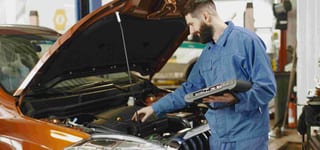Everything you need to know about OBD scanners

OBD scanners have become essential tools for both DIY enthusiasts and professionals in the automotive industry. These handy devices provide a wealth of information about vehicle health and performance, enabling users to diagnose and resolve issues quickly and effectively. In this article, we delve deeper into what OBD scanners are, how they work, and why they are so important for car owners and mechanics alike.
What is an OBD Scanner?
An OBD (On-Board Diagnostics) scanner is an electronic device designed to communicate with a vehicle's On-Board Diagnostics system. This system monitors and controls various aspects of the car's performance and functioning, such as engine and emissions systems. The OBD scanner connects to the vehicle's diagnostic port (OBD port), which is typically located under the dashboard.
How does an OBD Scanner work?
Firstly, Establishing Connection
When an OBD scanner is connected to a vehicle's OBD port, it establishes a connection between the device and the vehicle's On-Board Diagnostics system.
Secondly, Reading Data
Next, the OBD scanner reads the codes and data transmitted by the vehicle's On-Board Diagnostics system. These codes provide information about any problems or errors occurring in various systems of the vehicle.
Additionally, Data Interpretation
After reading the data, the OBD scanner interprets this information and translates it into readable data that can be displayed on the device's screen or via a companion mobile app.
Also, Diagnostic Functions
Some advanced OBD scanners offer diagnostic functions such as resetting fault codes, checking sensors, monitoring performance parameters, and even performing specific tests on various vehicle systems.
Why are OBD scanners important?
Not just for professionals
OBD scanners are no longer solely the domain of professional mechanics. With the advent of affordable and user-friendly OBD scanners, they are now accessible to car owners who want to perform their own maintenance or simply monitor their vehicle's health.
But also for preventive maintenance
By regularly using an OBD scanner, potential issues can be detected early before they escalate. This enables car owners to perform preventive maintenance and avoid costly repairs.
Moreover, time and cost savings
Using an OBD scanner can also help save time and money when diagnosing and repairing vehicle issues. By quickly diagnosing the problem, unnecessary repairs can be avoided, and the vehicle can be back on the road faster.
However, limitations
It is important to note, however, that OBD scanners cannot detect all vehicle issues. Some problems still require professional diagnosis and repair by a qualified mechanic.
Types of OBD Scanners
OBD-I vs. OBD-II
There are two main types of OBD scanners: OBD-I and OBD-II. OBD-I scanners are designed for older vehicles equipped with an earlier version of the On-Board Diagnostics system. OBD-II scanners, on the other hand, are compatible with most vehicles produced after 1996 and equipped with the newer OBD-II standard.
Wireless vs. wired scanners
OBD scanners are also available in wireless and wired variants. Wireless scanners connect to a smartphone or tablet via Bluetooth or Wi-Fi, while wired scanners are directly connected to the vehicle using a cable.
Where to Buy OBD Scanners?
You'll find the widest range of OBD scanners at OBDlink.nl. We provide genuine advice on our products and assist you with the most complex issues.
Conclusion
OBD scanners are indispensable tools for car owners and mechanics, enabling quick and effective maintenance and diagnosis of vehicle issues. With a wide range of features and options available, OBD scanners can be tailored to the needs of different users. Whether you are a seasoned professional or a novice car enthusiast, an OBD scanner is a valuable investment that can help keep your vehicle in top condition and minimize unexpected repair costs.
